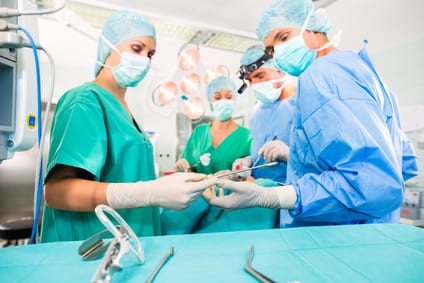Find Surgical Tech Schools Today
What is the process to become a Surgical Tech?
Below we walk you through the process to become a surgical tech. Follow the steps and you can be on your way to a rewarding career in a medical field that is growing and has a real bright future!
STEP 1 – Earn Your High School Diploma or GED
To be eligible for surgical tech training candidates must be a H.S. graduate or have their GED equivalent.
STEP 2 – Select the Right Surgical Tech Program for you
There are a many options for surgical technologist training. We will show you how to find accredited programs in a few clicks. Surgical technicians will often earn their associate degrees. They will do this at either through community colleges or vocational schools in most situations. A great place to look for accredited schools is to select a program that is accredited by the (CCAHEP) Commission on Accreditation of Allied Health Education Programs. If you use there database you can be sure you will start on the right path to certification.
Accredited Surgical Tech Programs
Below are what we consider the top accredited training options for surgical technologists and technicians. Surgical technicians and technologists must attend a program accredited by the Association of Surgical Technologists chosen accrediting body for their programs, which is the Commission on Accreditation of Allied Health Education Programs (CAAHEP). Below is a link to their database of all the accredited Surgical Technology Programs.
Step 3 – Earn you Surgical Tech Certification
Getting certified is not required in all 50 states but it cannot be understated that being certified helps you prepare for the career and get yourself hired as a tech. There are numerous options and certificates you can get, but we recommend certification through either the National Board of Surgical Technology and Surgical Assisting or the National Center for Competency Testing. Another good certification to get is a CPR certification.
Pass the Certification Exam
Receiving a license as a (CST) Certified Surgical Technician from the (NBSTSA) National Board of Surgical Technology and Surgical Assisting is the best way to prep your future as an operating room tech.
To be eligible for the CST examination candidates must have either:
Held a previous CST certification
Have associate’s degree from an accredited surgical technology program
Have associate’s degree from a surgical first assistant program
Have military experience/training in surgical technology
Proof of your eligibility will be required before applying to take the examination. A copy of your transcript is needed for proof of education. Military service proof is done by sending a copy of your DD-214 (make sure your base where you trained is listed). The fee for the examination application can range from $190 to $290.
Find a job as a Surgical Technician
If you get certified your chances of getting a job as a operating room tech increase. If you graduate from an accredited program and get certified as a CST you are on your way!
About Surgical Technologist salary
Operating room techs and surgical techs are paid more than the average allied health workers with comparable education as you can see below:
Surgical technologists $46,310
Health technologists and technicians $43,590
Total, all other allied health occupations $37,690
source – bls.gov
What is the average salary for a Surgical Tech?
The average pay for surgical techs is $46,310 per year and $22.26 per hour per the latest data from bls.gov. The career as a whole pays more than the average allied health career for jobs with similar education demands too!
Surgical Technician salary by state
| State | Avg Hourly | Avg. Salary |
|---|---|---|
| Alabama | 16.49 | 34,300 |
| Alaska | 25.21 | 52,440 |
| Arizona | 23.55 | 48,990 |
| Arkansas | 19.35 | 40,240 |
| California | 27.47 | 57,140 |
| Colorado | 24.18 | 50,300 |
| Connecticut | 26.28 | 54,660 |
| Delaware | 21.02 | 43,730 |
| District of Columbia | 27.49 | 57,170 |
| Florida | 19.15 | 39,820 |
| Georgia | 18.83 | 39,160 |
| Hawaii | 27.05 | 56,270 |
| Idaho | 20.04 | 41,670 |
| Illinois | 21.3 | 44,310 |
| Indiana | 20.04 | 41,680 |
| Iowa | 18.69 | 38,870 |
| Kansas | 19.35 | 40,260 |
| Kentucky | 18.59 | 38,680 |
| Louisiana | 18.73 | 38,950 |
| Maine | 20.94 | 43,560 |
| Maryland | 23.18 | 48,220 |
| Massachusetts | 23.88 | 49,670 |
| Michigan | 20.38 | 42,400 |
| Minnesota | 24.25 | 50,450 |
| Mississippi | 17.2 | 35,780 |
| Missouri | 19.69 | 40,950 |
| Montana | 20.69 | 43,030 |
| Nebraska | 19.9 | 41,390 |
| Nevada | 27.64 | 57,500 |
| New Hampshire | 22.91 | 47,650 |
| New Jersey | 22.99 | 47,830 |
| New Mexico | 20 | 41,590 |
| New York | 24.04 | 49,990 |
| North Carolina | 19.16 | 39,850 |
| North Dakota | 18.68 | 38,860 |
| Ohio | 20.39 | 42,420 |
| Oklahoma | 18.28 | 38,030 |
| Oregon | 23.53 | 48,950 |
| Pennsylvania | 19.49 | 40,530 |
| Rhode Island | 23.83 | 49,570 |
| South Carolina | 17.74 | 36,900 |
| South Dakota | 18.46 | 38,390 |
| Tennessee | 18.57 | 38,620 |
| Texas | 21.18 | 44,050 |
| Utah | 18.3 | 38,060 |
| Vermont | 18.78 | 39,060 |
| Virginia | 22.81 | 47,450 |
| Washington | 24.18 | 50,290 |
| West Virginia | 17.68 | 36,780 |
| Wisconsin | 23.76 | 49,420 |
| Wyoming | 22.05 | 45,870 |
Source: www.bls.gov
Salary by employer type
Below is what the average pay is at the common places of employment operating room technicians.
Outpatient Care Centers $48,900
Physicians Offices $45,980
Hospitals $45,930
Dentists Offices $44,760
Source: www.bls.gov
What does a Surgical Technician do?
Surgical technologists and technicians job duties vary from job to job. Typically they perform duties like handling surgical instruments that will be used in surgery. Other duties technicians will do during operations and surgical procedures are checking a patient’s medical chart and ensuring all necessary consent forms are available and ready to be filled out if more procedures are needed. Operating room techs work with surgeons and registered nurses in their procedures in most situations. Below is a detailed look at their specific job duties.
Count surgical supplies (ie: sponges and instruments)
Maintain sterile environment
Prep operating rooms for surgery
Prep patients for surgery, (washing/disinfecting incision sites)
Sterilize surgical equipment (gather adequate supplies for surgery)


